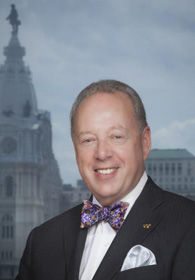Here we are in a new calendar year, but we are well along in our academic year and looking forward to events that will unfold in the next few months. The Class of 2016 is awaiting Match Day with bated breath, while our admissions officials are busy assembling the Class of 2020. Not that I am so eager for the changing of the guard: The current fourth-year students began their medical education just weeks after I was appointed Dean, and their progress through the school has been a pleasure to participate in and watch. Yet May will come, bringing with it Commencement, and they will be off. This year we can be consoled in part by the arrival of former graduates for an all-Alumni Weekend that will overlap with Commencement for the first time.

Daniel V. Schidlow, MD
I think the alumni will be proud, as I am, that we have a very high degree of volunteerism in the College of Medicine. The LCME requires that medical schools provide opportunities for students to participate in extracurricular activities, including voluntary service-learning experiences. We have assured that such opportunities exist. We know the students appear to be quite involved and even devise new service programs of their own. But until recently we have not had the tools to assess the depth and scope of their engagement. Now we are able to collect and analyze this information with an instrument created by Amy Fuchs, MD — an electronic student portfolio. Dr. Fuchs, senior associate dean for student affairs, developed the electronic student portfolio as her institutional action project when she was an ELAM* fellow.
This portfolio gives us a detailed account of the civic engagement activities of our students. For example, in the Health Outreach Program, students have the opportunity to provide primary health services under the direct supervision of a licensed physician. During 2015, 350 students volunteered in these clinics, seeing approximately 3,000 low-income and uninsured patients. During the summer, 33 students worked at 22 community sites though the "Bridging the Gaps" Community Health Internship Program.
These extracurricular activities are in addition to the service component that has long been required of our first-year students, who provided more than 7,500 hours of community service during the past year. When the new curriculum is rolled out beginning with the Class of 2017, a longitudinal community care practicum will be an integral part of the first two years.
We are a medical school in an urban university, and we need to be concerned about the conditions in which health care takes place. I am very proud of our student body and their commitment not only to service generally but also to our urban environment. We believe in President Fry's goal of being the most civically engaged university, and we want to be the most civically engaged medical school.
Daniel V. Schidlow, MD
Walter H. and Leonore Annenberg Dean
Senior Vice President of Medical Affairs
* Editor’s note: ELAM® is the College of Medicine's Executive Leadership in Academic Medicine® program for women.